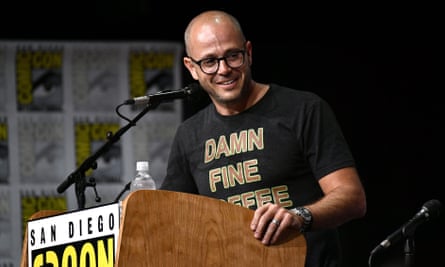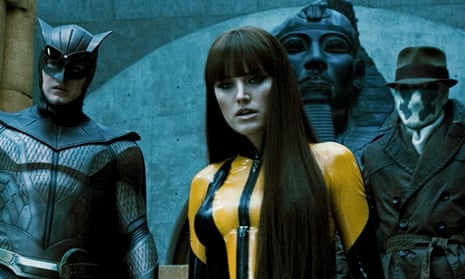In recent months, a spate of books has been adapted for TV, with Joseph Heller’s Catch-22, Ray Bradbury’s Fahrenheit 451 and Dave Gibbons and Alan Moore’s Watchmen in varying stages of production. They share something in common: all have been made into films – none of which have worked. The film versions had prestige directors Mike Nichols (Catch-22) and François Truffaut (Fahrenheit 451), while Zach Snyder took on Watchmen with a $120m budget. But despite the big names with big budgets, they couldn’t quite pull it off.
Early attempts at TV adaptations of notoriously unwieldy literary creations haven’t been straightforward. Amazon had an ill-advised crack at F Scott Fitzgerald’s unfinished novel The Last Tycoon, the second Fitzgerald project it had taken on after its original series (Z: The Beginning of Everything) about his relationship with his wife Zelda. Widely felt to misfire (“there’s none of the chemistry, the fire and thunder of the great writer” wrote Sam Wollaston), The Last Tycoon went the way of Elia Kazan’s equally soporific 1976 movie, which – despite a cast that included Robert De Niro, Jack Nicholson and Jeanne Moreau, and a Harold Pinter screenplay – fell flat and would be the director’s last film.
TV, with its capacity for long-form storytelling, can suit these “unfilmable” projects. Turning movie adaptations of novels into TV shows has worked in varying degrees. Hannibal, Bates Motel and The Exorcist were huge successes, while others, such as the Stephen King adaptation The Mist, and the woeful Rosemary’s Baby failed dismally. It was clear that material ideally suited to the film format was stretched too thinly to justify a series.
Watchmen’s new showrunner Damon Lindelof (The Leftovers, Lost) has to contend with Alan Moore, who is famously resistant to any TV and film adaptations of his work. “Things that we did in Watchmen on paper could be frankly horrible or sensationalist or unpleasant if you were to interpret them literally through the medium of cinema,” he told the Guardian in 2009. “When it’s just lines on paper, the reader is in control of the experience – it’s a tableau vivant. And that gives it the necessary distance. It’s not the same when you’re being dragged through it at 24 frames per second.”

So with scorn from authors, and scepticism from fans, what prompts these attempts at the unfilmable? Ego is a consideration, and a desire to succeed where others have failed. With the advance of special effects, previously challenging books are now within the realm of possibility. Tolkien’s Lord of the Rings trilogy is the best example of this, with Amazon’s eye-wateringly expensive take on the books currently in development. The need for streaming sites to seek their answer to huge hits such as Game of Thrones may also be a factor. Adaptations of ambitious books make headlines, fuel interest and – if done correctly – can be spun out into decades-long franchises.
Another unfilmable project that fits into the epic lineage is Martin Freeman’s planned series version of John Milton’s 17th-century poem Paradise Lost, which producer Laurence Bowen has described as a “biblical Game of Thrones”. The Crow director Alex Proyas gave up on his own adaptation of the poem in 2012 (with Bradley Cooper as Lucifer) due to budgetary issues.
For Lindelof, Watchmen is a passion project. He was first given a copy of the series at the age of 12 by his father, and though he acknowledges that Moore “most certainly doesn’t want us to be doing this”, he is “trying to find a way to do it that honours him.
“It is more timely now, in 2018, 2019, whenever the show airs, if it airs, that it needs to be told,” he said. “The reason that I’m doing this is these are dangerous times, and we need dangerous shows.”
Adaptations of literary classics that speak to contemporary issues will be likely to continue to prick the ears of commissioners . After ordering a six-part series adaptation of Catch-22, which will star George Clooney, Hulu chief content officer Joel Stillerman positions the show as the new Handmaid’s Tale, which is often praised for its timeliness. “Catch-22 is a rare story that has withstood the test of time,” he said. “Not only as a literary masterpiece, but as a story that still resonates in today’s political and social conversation.”
Done correctly, these so called “unfilmable” projects can trigger conversations that the original texts were meant to ignite. But when they fail, the topic shifts to why on earth TV makers and films studios don’t just leave them alone.

Comments (…)
Sign in or create your Guardian account to join the discussion